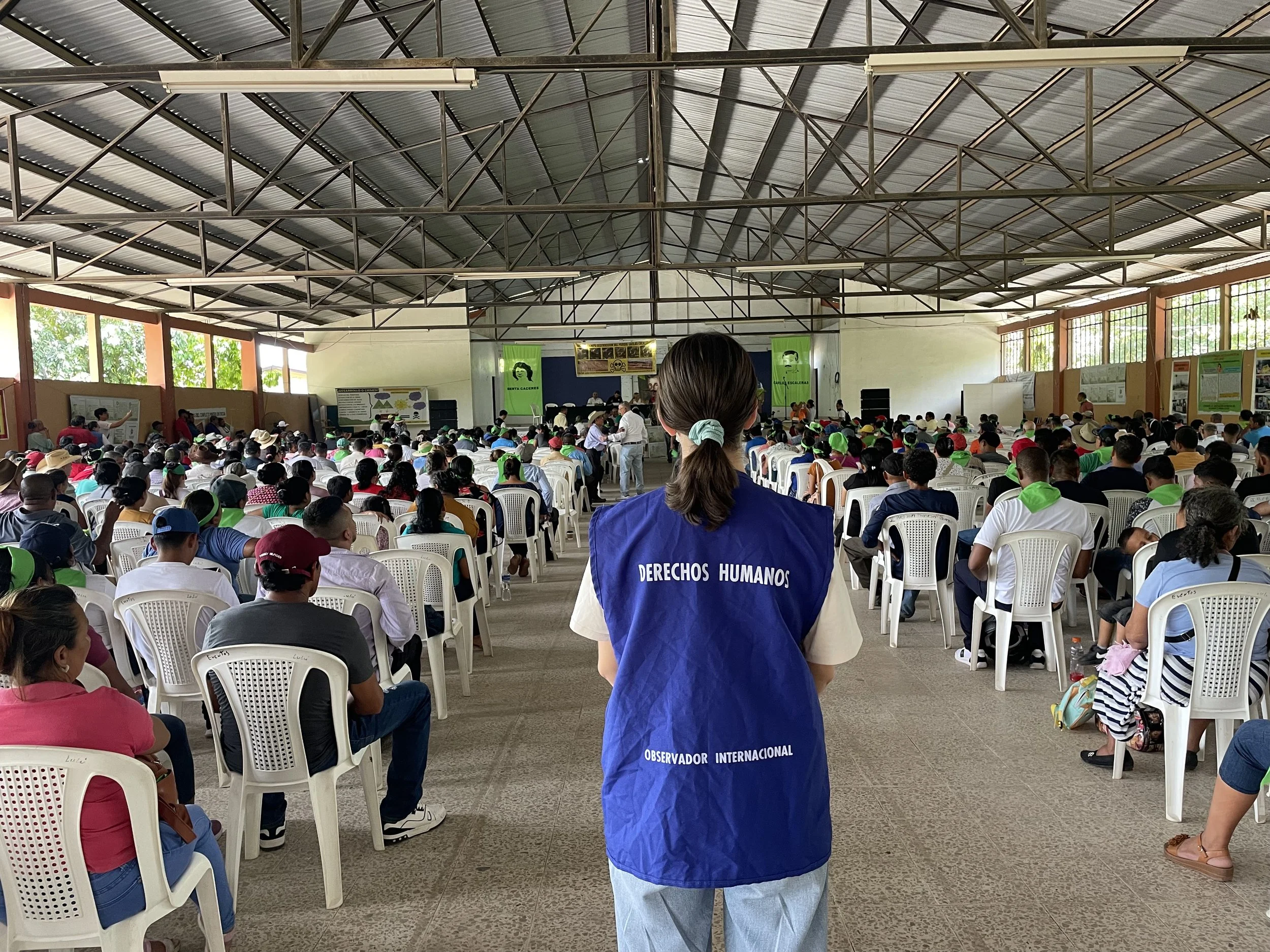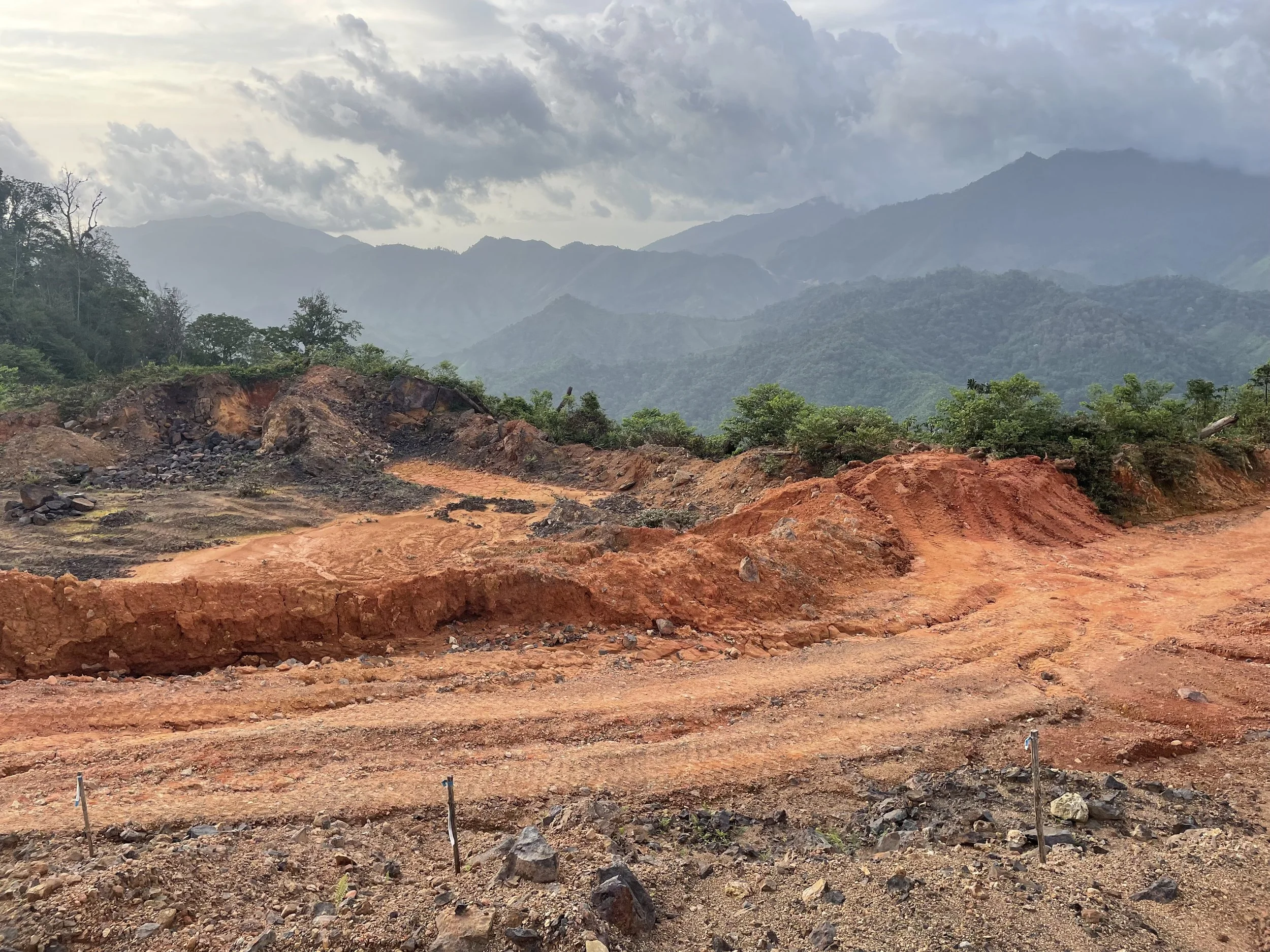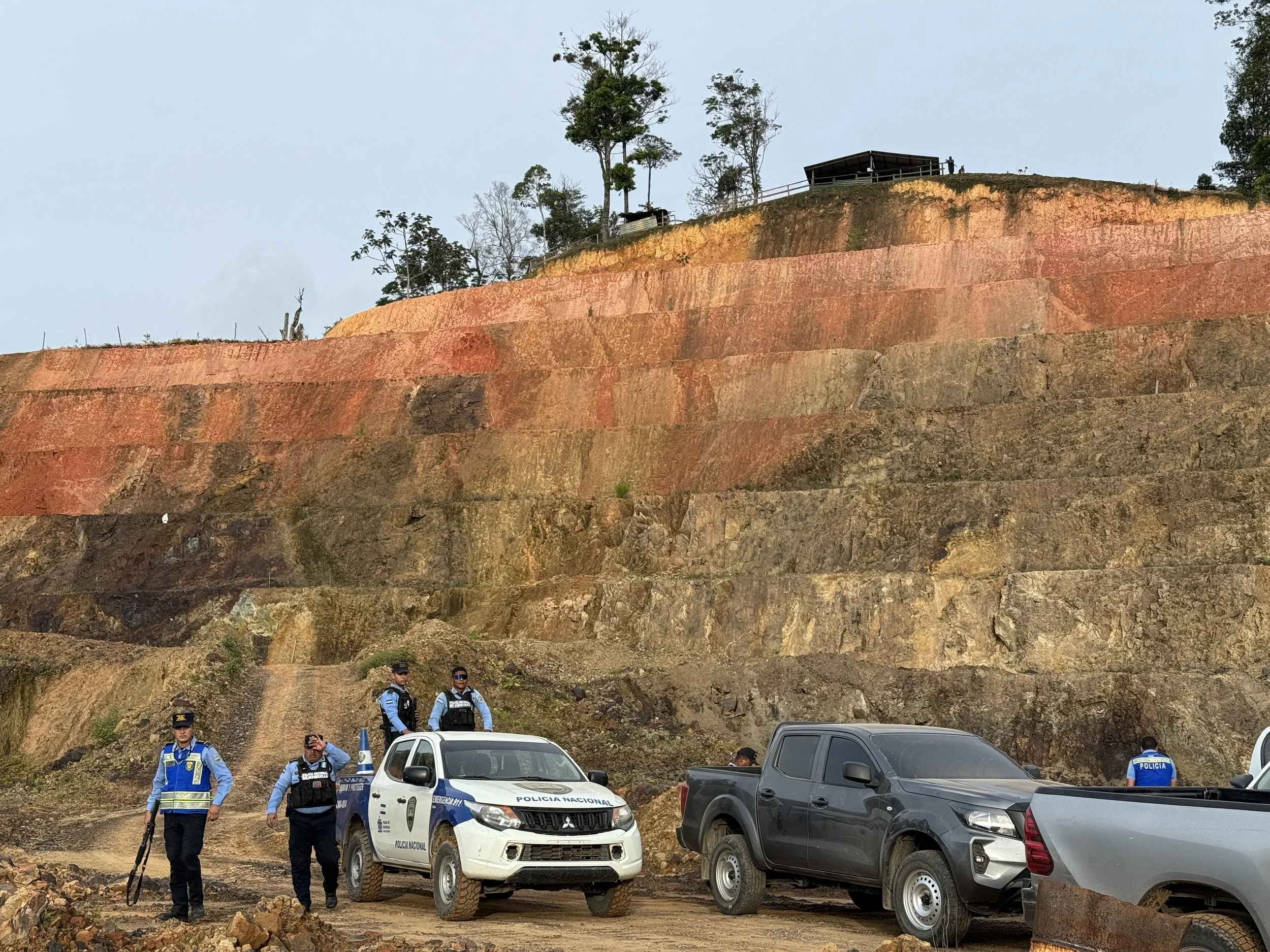Aguán News Alert | July 2024
Image Description: Communities in Tocoa oppose the illegitimate thermoelectric plant. The banner reads “In the Aguán we have the right to live without violence and to defend our natural resources.” | Photo Credits: CATRA Team
In Defense of Land and Life
Tocoa, Colón, Honduras. – During the months of July and August, the organized communities of the Bajo Aguán secured many important achievements. Nevertheless, land defenders continued to face grave threats, despite multiple visits from international observers. Additionally, they demanded that the government of President Xiomara Castro respect campesino land possession investigate the abuses of the armed forces against campesinx communities on behalf of large agribusiness companies; and launch a plan to protect human rights and environmental defenders in the Aguán region.
During the month of July, the organized communities of the Bajo Aguán, including those represented by the Municipal Committee in Defense of Common and Public Goods of Tocoa (CMDBCPT in Spanish), the Coordinator of Popular Organizations of Aguán (COPA in Spanish), and the Agrarian Platform, organized to recuperate the “Carlos Escaleras Mejía” National Park through a Popular Assembly and a visit to the Park. These actions took place within the context of the grassroots-driven approval of Decree 18-2024, which recuperates and protects the core zone of the Carlos Escaleras National Park and followed a series of governmental decisions that suspend open-pit mining activities in the Park and other protected areas. July also marked the second anniversary of the cooperative “Brisas del Aguán”, as well a important meetings between members of the Agrarian Platform and COPA and government ministers to work towards a solution to the agrarian conflict that grips the country, especially in the Bajo Aguán.
During the month of August, violent incidents against campesinx families and land defenders in the Bajo Aguán and other areas of the country began to increase again. In the Aguán, criminal groups shot members of the cooperativa “Remolino”, while in El Progreso, Yoro, campesinx families from the Landless Campesino Movement suffered various attacks from the sugar company, AZUNOSA. On August 4th, hitmen shot multiple times at Olman García Ortiz, the coordinador of the Campesino Movement of Ceibita Wa affiliated with the National Union of Rural Workers (CNTC in Spanish), resulting in his death. The criminalization of campesinxs and land defenders continued throughout both months as well.
Image Description: Representatives of the organized popular movements of Tocoa, government officials, and the United Nations take a picture with historic Decree 18-2024. | Photo Credits: CATRA Team.
Latest News
Popular Assembly and Visit to Carlos Escaleras National Park: On July 3rd, the Municipal Committee in Defense of Common and Public Goods of Tocoa (CMDBCPT in Spanish) organized the Grand Popular Assembly for the Common Home. The assembly was carried out to clarify the implementation of Decree 18-2024 with various government entities. Decree 18-2024 reestablishes the original limits of the Carlos Escaleras National Park and prohibits mining in “protected areas”. The Secretary of Natural Resources and the Environment (SERNA in Spanish), the Secretary of Human Rights, the mayor of Gualaco, the UN Office of the High Commissioner for Human Rights (OHCHR) were present, as well as representatives of the organized communities of the Bajo Aguán. The participants also made a visit to Carlos Escaleras National Park to see the damage caused by the mining company Inversiones Los Pinares in the Park.
Visit from International Observers: During the month of July, international observers accompanied the Grand Popular Assembly for the Common Home, as well as the visit to the Carlos Escaleras National Park, where they were able to verify the presence of armed men that protect the interests of Inversiones Los Pinares. International observers also visited some of the campesino cooperatives that make up the Agrarian Platform, where they documented the anxiety of campesinx families, after violent threats against them in June.
Fire at Tocoa Town Hall: Late in the night of July 4th, unknown people burned sections of the town hall building of Tocoa, Colón. According to the spokesperson for the National Police, José Miguel Martinez, “...it is evident that there is a plan to destroy or burn down this public center.” The CMDBCPT denounced the premeditated violence of the fire, stating that “the Committee repudiates this criminal act and joins the demand for an impartial, objective, and transparent investigation to be carried out, to clarify the facts pointed to by the National Police.”
INHGEOMIN refuses to renew the mining license of Los Pinares: On July 11th, the Honduran Institute of Geology and Mining (INHGEOMIN in Spanish) dismissed the request for an extension for the ASP and ASP 2 mining concessions, where Inversiones Los Pinares operates in Carlos Escaleras National Park. Juana Esquivel, a member of the Municipal Committee, declared that this Resolution No.209/2024 “is a small but important step to us.” All of the components of the EMCO megaproject must cease now!
Defamation Campaign: The Agrarian Platform and COPA strongly denounce the defamation campaign against the CMDBCPT that attempts to derail investigations into the fire at the Tocoa town hall by insinuating that members of the Committee are responsible. This campaign is yet another attempt to criminalize the CMDBCPT and the defense of land and life in the Aguán
Sit-In at the INA: On July 16th and 17th, the Civic Council of Popular and Indigenous Organizations of Honduras (COPINH in Spanish) took over the facilities of the National Agrarian Institute (INA in Spanish) due to their failure to fulfill Lenca land titles. COPA and the Agrarian Platform accompanied COPINH in their demand for the titling and restructuring of the ancestral lands and territories of the Lenca people. The organizations denounced the delay, since many of these processes have been before the INA for more than 15 years. Nevertheless, the rights of the Indigenous and campesinx communities have not been respected, despite the obligation of the State according to Honduran laws and international agreements. On July 19th, COPINH signed an agreement with the INA regarding the recognition and titling of Lenca lands.
The Aguán continues contributing to a solution to the agrarian conflict: Members of COPA and the Agrarian Platform traveled to Tegucigalpa to continue the process of resolving the agrarian conflict that persists in the Bajo Aguán, created and reinforced by various governments In June 2023, the government of Xiomara Castro created the Commission for Agrarian Security and Access to Land, supposedly to deal with the conflict. However, for more than a year, this Agrarian Commission has been utilized by large agribusiness to execute land evictions against campesinxs. In a meeting of the Agrarian Commission on July 18th, they reported that there have been more than 50 of these evictions since the commission was formed. The organized communities of the Aguán met with members of the national government to express their concerns surrounding the current situation in the region.
High-level governmental meetings:
On July 25th, representatives of 15 of the cooperatives and campesino associative companies that make up the Agrarian Platform and COPA, with participation from the OHCHR, met with Francisco Funes, director of the National Agrarian Institute (INA). Funes also serves as the Coordinator of the Agrarian Commission. Commitments of Minister Funes:
Commitment to the work of the legal subcommission that must present a report on the methods and processes used for the dispossession of campesinxs from lands reserved for the Agrarian Reform
Commitment to coordinate follow-up actions with the Minister of Human Rights for the fulfillment of the February 22 Agreements of 2022
Commitment to carry out the necessary steps for the installation and execution of the Tripartite Commission
On July 26th, member organizations of the Agrarian Platform and COPA met with representatives of the Secretary of Human Rights, including Minister Angélica Álvarez and Vice Minister Héctor Longino Becerra with the goal of sharing a series of concerns regarding the current situation in the Aguán the installation of the Tripartite Commission and the fulfillment of the February 22, 2022 Agreements. Minister Álvarez is also th Executive Secretary of the Tripartite Commission. Commitments of Minister Álvarez included:
Commitment to promote and manage the installation of the Tripartite Commission before the appropriate bodies
Commitment to convene the ministers of the different Secretaries who signed and monitored the process for the fulfillment of the February 22 Agreements of 2022
2nd Year Anniversary of Cooperative “Brisas del Aguán”: On July 25th, 291 families organized in the campesino agricultural cooperative “Brisas del Aguán” celebrated two years of permanently occupying lands from the Agrarian Reform through a legal process with the possession of property titles granted by the National Agrarian Institute (INA). On July 25th, 2022, the families that make up the cooperative “Brisas del Aguán” made the decision to recuperate their lands, which were stolen for more than two decades through deception, threats, persecution, criminalization, forced displacement and assassinations against campesinx leaders.
INHGEOMIN refuses to renew 4 mining licenses, citing Decree 18-2024: On July 30th, INHGEOMIN published a statement on social media, announcing to the public that the mining rights of four concessions inside Carlos Escaleras National Park (Las Golondinas, El Venado, ASP and ASP 2) “were not renewed according to the Legislative Decree 18-2024.”
Image Description: Celebration of Brisas del Aguan 2nd Anniversary. | Photo Credits: Plataforma Agraria.
Member of Remolino Cooperative Still Missing
Abel López Perdomo is still missing, after being kidnapped on January 30, 2024. Popular and social organizations in the Aguán region continue to ask the government to execute a Search Plan and denounce the lack of response on the part of authorities to implement an effective search.
Historical Context
In the 1990’s, World Bank-led structural adjustment measures transformed the Bajo Aguán region of north-east Honduras from one of the nation’s primary sources of fruits, vegetables and basic grains into an African palm oil monoculture destined for export to insatiable Global North markets. Over the course of this process, thousands of campesinos were dispossessed of their farms to make way for massive palm plantations, owned by a handful of Honduran elite.
Since then, campesino cooperatives have engaged in a multi-decade struggle to recover their land, suffering violent repression by corporate and state entities as a result. The immediate post-coup period was especially brutal, taking the lives of approximately 150 small farmers by 2014. In recent years, many more have been murdered, disappeared, and criminalized. The vast majority of these crimes remain in impunity.








